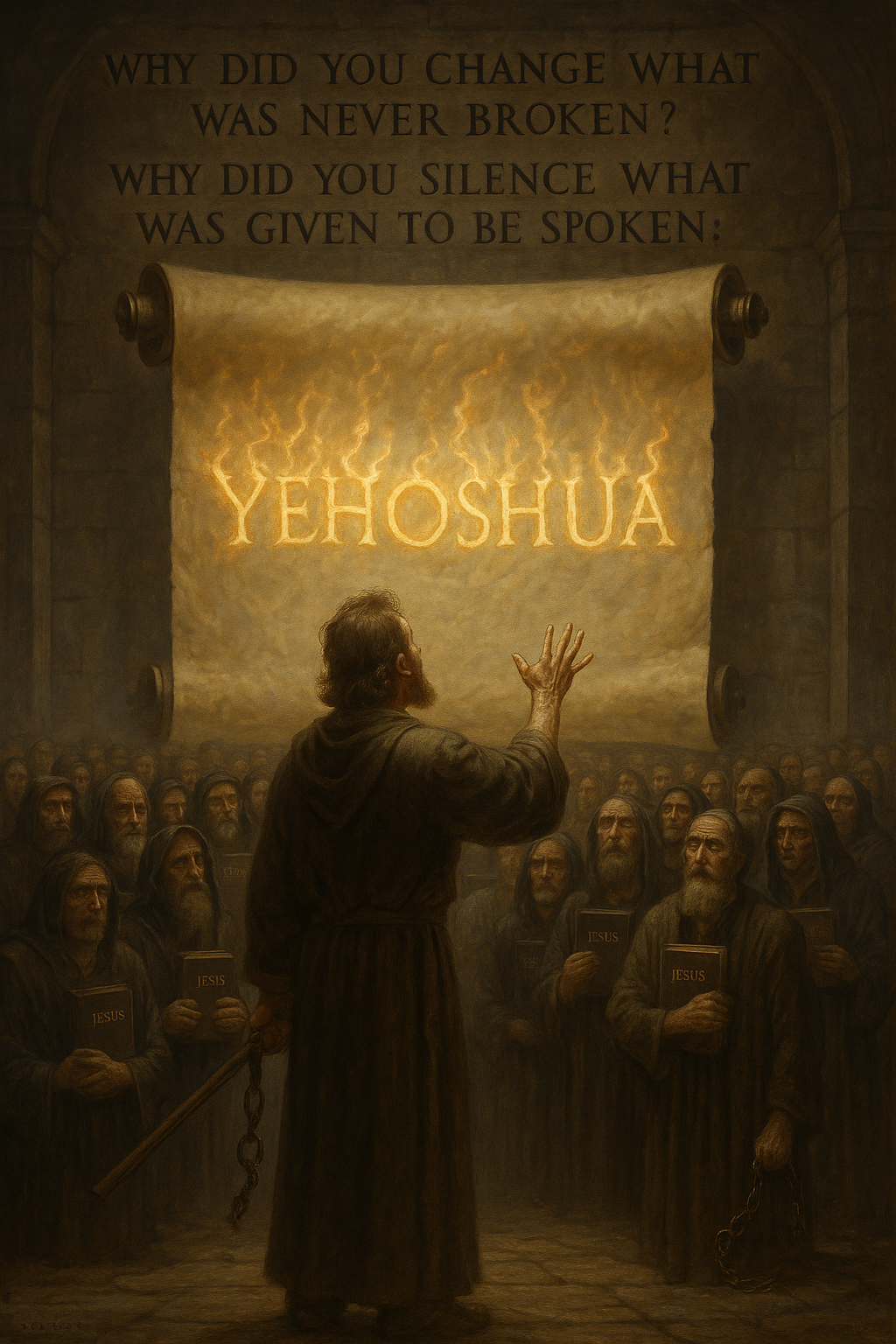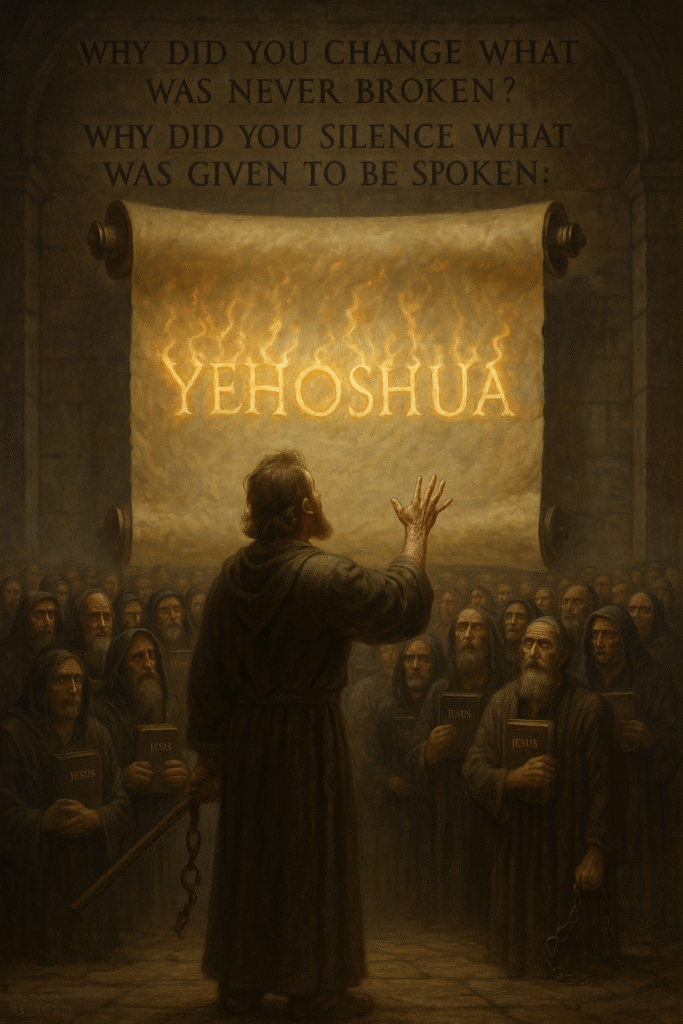Physical Address
304 North Cardinal St.
Dorchester Center, MA 02124
Physical Address
304 North Cardinal St.
Dorchester Center, MA 02124
With Michael Walker
With Michael Walker

To Whom it may concern….

There is a sound that was given, and there is a sound that is spoken. The tragedy is that they are no longer the same. This is not a debate about translation, transliteration, or orthography. This is about covenant, memory, and the reverence of the Name that was once spoken by the voice of the Father, echoed through the mouth of Gabriel, declared by the prophets, and cried out by the early assembly. This is not a matter of linguistic evolution. It is a matter of spiritual substitution. And it all comes down to this: why did you change what did not need to be changed? Why did you touch what did not need to be touched? Why is the Name now unknown to the people who claim to be called by it? If it was never broken, why did the world break it?
In the purest essence of human interaction, names are not translated. They are repeated. They are echoed back as they are heard, carrying the full identity, presence, and meaning of the person who bears them. If I introduce myself as Michael, you do not render my name into a new linguistic form. You repeat it. You do not change it to Michel, Miguel, Mikhail, or Mitch unless you are filtering my identity through the lens of your own tongue rather than honoring it in mine. And herein lies the core of the issue: names are not concepts. They are not ideas. They are not definitions to be rendered. Names are identity. Names are sound. Names are covenant.
The name given to the Messiah was not arbitrary. It was not selected for aesthetic appeal. It was not chosen because it fit nicely into religious literature. It was chosen because it was prophesied, encoded, and pre-ordained. “You shall call His name Yehoshua,” the angel declared — not because it was culturally convenient, but because it contained the Name of Yahweh and the verb of salvation. Yeho (יהו) — the sacred prefix of the divine Name. Shua (שוע) — to save, to deliver. His Name was not just a label. It was a declaration of His mission and His nature. It was, and is, the Name above every name. And yet, that Name was taken and replaced.
Greek could not carry the full phonetic structure of Yehoshua. It lacked the “sh” sound. It resisted male names ending in -a. It adapted names into its own structure. So when the Hebrew Name Yehoshua encountered Greek phonetic limits, the language did what all languages do when they cannot pronounce a foreign sound — it substituted symbols. Iēsous (Ἰησοῦς) was not a name replacement in intent, but a phonetic workaround — a placeholder, a bridge. But the bridge became the idol. The symbol became the standard. And what began as accommodation became substitution.
Then came Latin. Then came English. Then came empire, institution, and control. With each layer, the original Name was not merely adapted — it was buried. Pronunciation changed. Meaning vanished. Covenant identity was severed. And in its place rose a name that is now globally famous, universally worshipped, and yet fundamentally disconnected from its original sound, function, and authority. Jesus is not the Name that was given. It is the name that was manufactured. And it is not a translation. It is a substitution.
If we erased every book from history, if all literature disappeared, if no man had access to written scrolls or phonetic alphabets, the Name would still be known. Why? Because it was first spoken, not written. Faith comes by hearing. Salvation comes by calling. Confession comes by mouth. The Name is not preserved through ink, but through voice. It is not protected through literature, but through utterance. If the Ruach HaKodesh were to declare the Name again from heaven today, He would not say “Jesus.” He would say what He always said: Yehoshua.
This is the test — the auditory test. Strip away every translation, every theological filter, every publishing house and commentary. What remains? The sound. The sound of the Name. And the Name that was given is the Name that remains. But what we speak today is not that Name. We speak a sound that was never spoken by the prophets, never heard in the upper room, never declared by the angel of the Lord. The modern sound is not the ancient Name. So the question returns: why did you change what did not need to be changed? If it ain’t broke, why did you break it?
The biblical pattern is always rooted in sound. Adam named the animals — he did not spell them. Yahweh called Moses by Name — He did not write it in the sand. Gabriel delivered names audibly. The Name written on the thigh of the Rider in Revelation is not a silent title — it is a sound of war and victory. Names in Scripture are alive, not static. They are vessels of meaning, identity, and power. And the Name of salvation, Yehoshua, was given by divine decree. It was not open for translation. It was not a placeholder. It was not a suggestion.
Let us be clear: transcription is not substitution. Greek attempted to transcribe the Hebrew Name using the tools it had. Iēsous was not heresy — it was limitation. But the problem arose when Iēsous was later detached from Yehoshua entirely, when the meaning was forgotten, and when the Church began preaching a Name that the Messiah Himself never heard. The moment the Name was no longer recognized by the people who claim to follow Him, the substitution was complete. Jesus is not an alternate rendering. It is a complete replacement.
We do not say “Isa” for Isaiah, or “Mosheh” for Moses, yet we do not invent new names for them. We honor the original sound as best we can. But with Yehoshua, we did not honor — we rewrote. We rebranded. We renamed the Redeemer. This is not just a linguistic failure. This is spiritual malpractice. The enemy has always sought to replace identity with image, covenant with branding, glory with fame. The name Jesus has become a religious brand — a container that people fill with their own version of the gospel. But Yehoshua cannot be rebranded. He is who He is. His Name is not flexible. It is fire.
If you were to meet Him face-to-face today, what would you call Him? Would you cry out “Jesus,” the name passed down through Latin filters and Roman altars? Or would you call Him by the Name that heaven itself thundered into the womb of Miriam? The Name written on the foreheads of the 144,000? The Name that all knees shall bow to and all tongues confess? If you heard His Name from His own mouth, would it match the sound on yours?
This is not about semantics. This is about resurrection of identity. This is about restoring the sound that was spoken in eternity past and will be echoed in eternity future. It is time to return to the Name that was never broken. It is time to speak what was originally spoken. And it is time to stop worshiping a sound that was never given.
In the end, this is what it all comes down to: why did you change what did not need to be changed? Why did you touch what did not need to be touched? Why is the sound said no longer the sound given? If it ain’t broke, don’t break it. But we did. And now it’s time to restore what was taken. His Name is Yehoshua. That is the Name. That is the sound. And that is the covenant.
Amen.